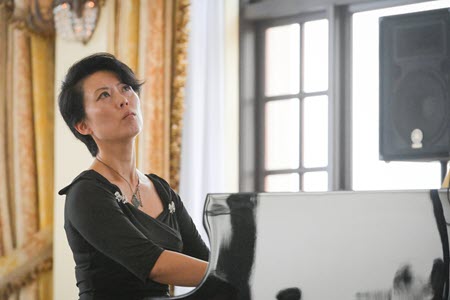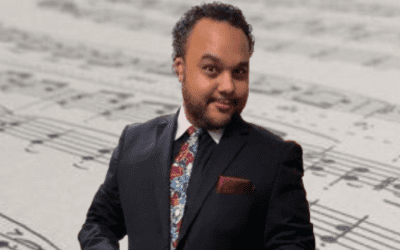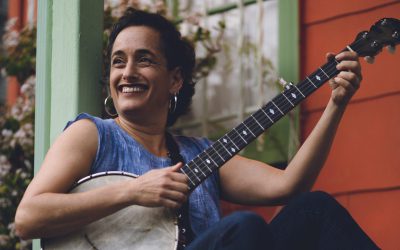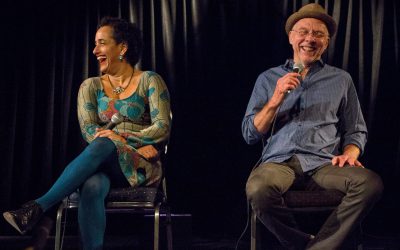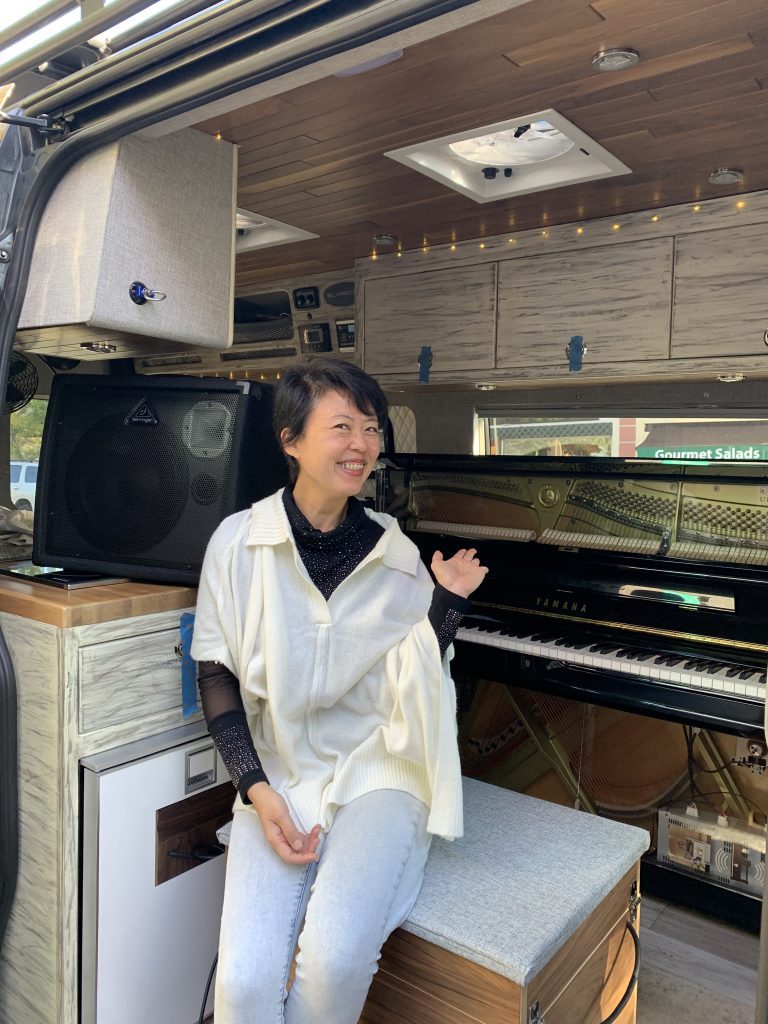
In her touring PianoVan, Makiko bringing her music to the people on the streets. Northern California 2021.
Makiko Hirata was trained as a classical pianist from an early age. Now an international pianist and a recording artist with ten released albums, Dr. Makiko calls herself “Dr. Pianist” and is on a mission to use the arts for climate action and to promote the power of music to heal and unite. In this episode, Makiko shares:
- Her perspective as a woman on her early training in classical piano and the personal questions she had to reconcile given the history of her art.
- Her involvement as a founding member of Tempo, Music for Climate Action.
- How musicians can serve as second responders during climate disasters.
- Music as a tool to help mitigate the way people feel about pain in medical settings, especially in managing their emotions.
- How she has shifted from being an “Olympian pianist” mindset that uses her training for mastery to instead playing simpler pieces to better serve and resonate with her audiences.
To listen to this episode as a podcast, search for Agile Vocalist anywhere you get your podcasts.
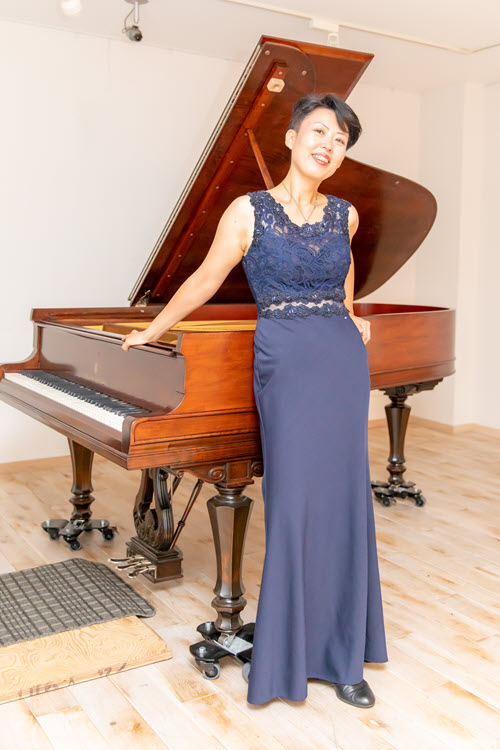
Makiko’s Bio:
An international pianist and a recording artist with ten released albums, Dr. Makiko Hirata is “Dr. Pianist,” on a mission to promote the power of music to heal and unite us. Her doctorate is a DMA, Doctorate of Musical Arts from Rice University. In addition to her concerts, she collaborates with neuroscientists to quantify the benefit of music and promote the power of music as an overlooked social resource through speaking engagements, workshops and writing. She is a US-Japan Leadership Program Fellow and a Coeuraj 2022 “Global Courage” Fellow.
Dr. Hirata has given recitals, lectures, concerto performances and outreach concerts in the Americas and Eurasia with ensembles and artists, such as the River Oaks Chamber Orchestra, the Pecs Hungarian Symphony Orchestra, conductor Leon Fleisher, and clarinetist David Krakauer. She has taught at New York University, Colburn Conservatory of Music, Rice University, and Lone Star College, and given master classes and lectures internationally. Dr. Hirata is a Shigeru Kawai Artist.
Musicolophilia by Oliver Sacks
Tempo, Music for Climate Action
Dr. Lucy Jones, the Earthquake Mother
Paul Slovic, University of Oregon
Music Makiko plays in this episode:
- Debussy, Isle of Joy
- Chopin’s Mazurka No. 3
- Ravel’s Alborada del Gracioso (Morning Song of the Jesters) from Suite Miroirs
Did you enjoy this? Please share it with your arts and sound-loving friends. Don’t forget to subscribe for more from Agile Vocalist.
Transcript
Makiko: When you’re on the stage, you are hyper sensitive, your awareness is on a whole different level from your day to day life. And like I hear people’s voices, not voices like breath, I hear people’s movements. I sense it. If I wasn’t orally perceiving it, I, you know, it’s very difficult to explain, but it is like a 6th sense. And also I can tell that they can tell that I’m feeling them sometimes.
And for example, at the end of a very, very soft piece, like, you know, I let my last chord go and then there is a silence in the hall and nobody moves and then it’s like, you know, like if you measure it, it is like a second and a half or two seconds, but it can feel like eternity and like, you know, you can hear the pin drop and then you can hear everybody sort of feeling the same thing, holding their breath, not wanting to let this moment go and this sort of feeling of connection, this bond, you know, that I think is unique to music.
Welcome. Listen to this next agile vocalist podcast, an international pianist and recording artist. With 10 released albums, Dr. Makiko Hirata is Dr Pianist on a mission to promote the power of music to heal and unite us. Her doctorate is Ad Ma a Doctor of Musical Arts from Rice University. In addition to her concerts, she collaborates with neuroscientists to quantify the benefit of music and promote the power of music as an overlooked social resource through speaking engagements, workshops and writing. She is a US Japan leadership program fellow and Coeuraj Program Fellow. Doctor Hirata has given lectures, recitals, concerto performances, and outreach concerts in the Americas and Eurasia with ensembles and artists such as the River Oaks chamber orchestra, the Pex Hungarian symphony orchestra, conductor, Leon Fleischer, and clarinetist David Krakauer.
She has taught at New York University, Colburn Conservatory of Music, Rice University and Lone Star College and given master classes and lectures internationally. Dr. Hirata is a Shiro Kawai artist.
Welcome Makiko. Thank you for joining me.
Thank you, Rachel.
Rachel: Thanks Makiko. Can you kick it off and share a personal story with us about how you began your career in the arts?
Makiko: Of course. So, I was born in Japan, but I grew up in Hong Kong from age 1 to 6.
And so apparently, according to my mom, when I started speaking, I would know one word in Cantonese, another word in Japanese and I could never finish the sentence in one language. And that made me very withdrawn and a little bit antisocial and there was a piano at home–an upright piano and I started picking out tunes on it and I preferred playing on it much more to going outside and playing with friends.
And pretty soon I got pretty good putting the left hand choral accompaniments to my right hand melody and singing to it and all that. And my mom told me that music was a universal language. That means that if you play the piano really well, I can make friends with anybody in the world. It doesn’t matter what language they speak, what culture they’re from. And I thought that sounded really good and that’s the ideal I’m still pursuing to this day.
Rachel: Oh, that’s beautiful.
So it’s clear that you, you clearly fell in love with music as a pianist. And so who would you say is most influential in why you chose to work in partnership with scientists?
Makiko: So yes, I was pretty single mindedly pursuing a solo piano career. But I, as a woman of color, I saw the inequality and injustices and abuses of power in the industry.
And long story short, I ended up pursuing a doctorate degree after I think, I don’t know, 10 or 15 years just on the road touring and concertizing. And my thesis for my doctoral degree revealed a lot of the historical roots of the racism and misogyny that I was witnessing when I was on the road and it was pretty discouraging, of course. And I started questioning whether it would be right for me to keep on this path as a classical pianist, as a Japanese woman. But when I was grappling with that question, I met a composer by the name of Todd Frazier.
He considers himself first and foremost a classical composer, music composer. But he also happened to be the Director of Center for Performing Arts Medicine at the Houston Methodist Hospital that was across the street from Rice University Campus. And I played one of his pieces in a concert and he approached me with this scientific topic and asked me if I wanted to be a test subject if I, you know, wanted my brain studied as a sample of a musician’s brain. And I’d already been curious about all of that having read Oliver Sacks and Musicophilia.
And so I jumped on the opportunity and when I went to the center, I started asking a whole bunch of questions to the F MRI technician and Todd about the benefit of music and how to quantify it and what kind of studies there have been out there. And, and Todd gave me a part time position as a consultant to the center eventually. The more I studied the benefit of music in neuroscience, the more I felt that I was still on the right path, that music is indeed universal, despite some of the more, you know, recent injustices that we’ve seen in the industry, music as a human practice is inherently humane. And so that’s how I started my work with neuroscience and now with other scientists as well, you have many pillars of music.
Rachel: With this, the, you know, the identity struggle here and, but you also talk a little bit about the pillars of music and that its power has been a little bit eclipsed, right? So we’re very now in the especially in the partial post COVID age, we’re rife with individualism and consumerism, right? And music is not enjoyed in social settings anymore than it used to be.
Rachel: Can you talk a little bit more about that context and how you’re navigating that to really unite us as that universal language you talked about?
No, thanks for the question. So I’ve learned through my work with neuroscience and my research that we don’t know of a civilization that existed with some without some kind of a musical culture. Music has a definite role in us being human, you know, human as social animals that depend on each other for survival. So we need to co-operate, commiserate and cohabitate and music helps us do that. How so communal experience of music synchronizes our heartbeats, our breathing to the phrasing of the music, even our brain waves. And as social animals, we find this very, very reassuring.
And so it lowers our stress hormone, the the cortisol level. It, you know, it lowers our blood pressure, it lowers our heart rate. It really, it helps us sort of appreciate our interconnectedness with each other and to our surroundings.
However, I am afraid that music technology as well as the aesthetic of the western classical music has detached us from that initial power of music that our ancestors need to rely on. So, you know, for example, more easily explainable is the music technology. So we listen to music today through earphones, headphones, you know, iphones, whatever, you know, all these technologies and we use it to shield ourselves from the rest of the world. And I think this is very unnatural and inhumane. And I wonder if this isn’t, this isn’t one of the things that makes us detached from each other that makes us less compassionate, that makes us less communal as a society.
Rachel: Yeah.
Makiko: And the individualism part. So especially having grown up in a traditional music pedagogy, you know, it’s about who can play the fastest, who can play the loudest, who can play the most difficult piece, who can learn a piece, the quickest, who, you know, it’s always sort of the industry and the whole world encourages competition, pit us against each other. When music for almost the entirety of human history has been communal, it was something that we were meant to, you know, practice together. It wasn’t about who was better, who was more in tune. It was, and, and for example, my instrument, the piano, it’s, it’s meant to be, to, to allow an individual, to make the entire music by him or herself. And that actually is not what music was meant to be in the first place.
Rachel: It’s amazing to me that you have that perspective on the piano.
The piano itself is made for, you know, unless you’re two small, very small people, it’s made for one person. And you know, I’ve had experiences hearing organists play where I didn’t realize where that other line was coming.
Rachel: It’s coming from the other hand, right? And so that’s ironic, right? It’s ironic, comment on that.
14:50 And when you think of that in that context, it makes sense that it’s a one-man orchestra. Because that’s when, you know, people really asserted themselves as individuals, right? So with the industrial revolution, massive urbanization happened. So this is people are not no longer living in small villages of 100 to 150 but they are living in cities of tens of thousands and they’re having to prove themselves as irreplaceable by other people or machines. And a piano was piano evolved very quickly. And I think one of the reasons why there became a such a huge market for it was because people sort it out as one way to assert their unique individuality. And as for the organ, actually, it’s interesting, you mentioned the organ–the organ is a very, very old instrument. But you know, so most of the churches have organs, pipe organs. And apparently, I’ve only, this is a red. No, I’m not an organist, but apparently, they considered pipe organ not to be played by the organ player. The what the organ player is doing is to press the keys to allow the air to pass through the pipes. So, who is actually making the sound is God himself?
Rachel: You’re involved with a movement and an organization called Tempo. It’s an initiative to promote dialogues amongst physical and social scientists and musicians. Can you tell us about your involvement with that organization?
Makiko: Yes, I’ll be happy to. So, it’s called Tempo Music for Climate Action. And it’s an initiative led by Dr Lucy Jones at Caltech. She used to be referred to as the earthquake mother and she still is an iconic figure where, you know, when a major earthquake strikes news channels likes to go to her to interview her, but she now refers to herself as a disaster scientist and she’s worried that climate change is going to do us way more harm multifold than the big one that she’s been warning people about for decades. And so she started tempo music for climate action. And I am one of the founding members.
The other members include, for example, Paul Slovic from University of Oregon, who is known for his studies for decision making in emergencies and like how you know how people react to catastrophes and why and things like this. He’s for a long time, he studied genocide and now he’s focused largely on climate issues and I feel very privileged to work with these amazing people. But we are all very concerned that there isn’t enough attention on the urgent crisis that we are seeing. And one of the reasons why this coalition has started is because there is now this sort of critical consensus about how the information about climate change has been communicated and how that has not been effective.
So apparently, according to social scientists like Paul Post Slavic, we do not associate emotions to things like data and numbers and emotions are what determines our actions. So, our thought is that if we are to use music to translate the scientific findings and to disseminate the information, it can potentially enhance the level of awareness and engagement in the global citizens, that is our hope sort of related to that.
Rachel: Can you talk and share about something you shared in past videos that musicians can serve as second responders for climate or for communities that are, you know, having climate catastrophes and natural disasters.
Makiko: My theory is that with the oncoming of the climate change we can expect a lot of natural catastrophes to happen all over the world and we will probably experience shortage of medical emergency stuff. And medical professionals are can only see one patient at a time and they need equipment and medicines to treat the patient. Whereas musicians can comfort and soothe a lot of people at once, not just the people who are physically injured, but it can address the stress of for example, the mothers of an injured baby. And you know, her stress would definitely transfer to the baby. And so reducing her stress would actually help the the baby as well, right? And so I think that, you know, there needs to be a real understanding of how musicians can be deployed from, you know, now on for all these different difficulties that we will probably be facing.
Rachel: So what, what you actually pinpointing is that and you, you alluded to this earlier is that sound and the music that we transmit over the sound waves is scalable in ways that traditional, you know, nursing patient care can’t. And so I, I think that’s a, I don’t know if you want to add anything more, but I think that’s a very exciting idea, that’s obvious, but no one talks enough about it, you know, so there are lots of work being done on.
Makiko: For example, in the public health sector, preventative medicine, things like this.The problem is that a lot of these studies are still very much theoretical. The study groups tend to be very, very small and they are not really applied in the real world settings. And also people who are not in the custom of reading these studies, academic fighting right journals. You know, a lot of people, even musicians don’t know about these things. And I’m hoping that somebody like myself can be, can help to disseminate but is really a crucial information.
Now, I think I’ve learned through my work with the neuroscientists that studies show how music helps mitigate our perception of pain. So it cannot address obviously the source of the pain. But how we feel about the pain that we’re experiencing music can definitely help with.
So, for example, a pre pandemic studies show that an intubated patient in IC us, their sedative intake gets reduced by on average 36%. So apparently intubation is the very painful process. You have this really thick tube down your throat to help you breathe, right?
And so they give you a lot of painkillers, but with music, they don’t need as much painkillers, thereby saving the hospital and the patients themselves money. And also other studies, for example, other studies show that, you know, having, having music in hospitals, reduce the number of days that patients stay in hospital.
23:11 And also in other studies I’ve read that mothers in labor, the average number of hours that mothers stay in labor gets to be reduced with music.
Rachel: Can you share as a, as a pianist, especially your perspective about the connection you have between touch and sound?
Makiko: Yeah. Thank you for that question. Now, so before I was really very much a hardcore, cerebral, serious classical musician wanting to play all things very dark and serious and passionate and fast and difficult and all that. But, you know, after my work with the neuroscience and after realizing that healers and shamans, for as long as we’ve known, our history used music as a healing agent. You know, I’ve come to feel quite differently about what it is that I do. So I generate sound, musicians, generate sound and sound waves travel through the air to touch its listeners and not just the ear drums, but the air that is around them. And I feel like what I’m generating is perceived as sound as a sound art, but it’s way more than that, that, you know, it is moving things, it is touching people, It is touching old things. And so now I tend to play a lot, sort of simpler pieces than before.
And the attitude with which I play now is not to overwhelm, which, you know, you get taught to do because you’re taught to compete basically like an Olympian, you know. So, so my, my goal has shifted from overwhelming my listeners to actually resonating with them, you know, to listen to their breath as I play and to sort of be mindful about the time and the space that we are sharing through the music that is that we are experiencing together.
27:03 So, and I’ve heard many artists talk about, you know, the power of connection when you’re performing. Can you talk a little bit about how you perceive an audience’s breath or is it more a figurative expression that you’re using when you’re performing?
Makiko: So when you are on the stage, you are hyper sensitive, your awareness is on a whole different level from your day to day life. And like, I hear people’s voices, not voices, like breath, I hear people’s movements. I sense it. If I wasn’t orally perceiving it, it’s very difficult to explain, but it is like 6th sense. And also like, I can tell that they can tell that I’m feeling them. And for example, at the end of a very, very soft piece, I let my last chord go. And then there is a silence in the hall and nobody moves and then it’s like if you measure it, it is like a second and a half or two seconds, but it can feel like eternity.
And like, you know, you can hear the pin drop and then you can hear everybody sort of feeling the same thing, holding their breath, not wanting to let this moment go and this sort of feeling of connection, this bond that I think is unique to music. So when you’re curating new music to learn or looking in new places, new ways to apply or expand your art, where do you go for inspiration and ideas? So, these days, because I’ve been wanting to be more socially relevant in my musical path. What inspires me is the current events. And I used to be totally oblivious. I used to live in practice rooms. I used to spend more time in front of the piano than in bed.
And I really was clueless about what was going on in the world. But I’ve changed and I want to hear the world and if I don’t, my music will become an archive of the past, it, it will not be alive. And, and so, for example, you know, what’s going on, all the sufferings that’s going on, not just in Ukraine, but, you know, still Syrians and Afghanistan and, you know, Ethiopia and the Uyghurs, and the Rohingyas and all these people imagining trying to, to sort of feel their pain drives me towards pieces like Chopin who was involved in a revolution to fight for coalition independence.
30:09 And yeah, I learned that on Earth Day this year, a man self-immolated in front of the Supreme Court building. And you know, the urgency that he must have felt to have to do that drives me to play certain pieces or play a certain way. You know, I hope no one else will have to feel like he or she has to do that to be heard. And I hope that somebody like me playing a passionate or, you know, despairing or pieces that expresses that kind of frustration can sort of sublimate some of these things that could drive people to take extreme measures growing up as a pianist, especially when I was younger, I thought I could achieve fame or fortune or whatever and, and have a platform big enough to impact, make some kind of an impact on the world.
But now I realize that even if I were to achieve that, that kind of impact is kind of fleeting and maybe not as meaningful one, there’s only so much that an individual can do and I am trying to offer myself as a prototype of a new style of music, making a new way for musicians to become more socially aware and involved. And I want to encourage musicians of all ages and all levels to consider the skills and passion that they have for music as something that could be useful to drive them, to want to learn, to apply it, to help each other and the world that was inspiring.
Narrator: Agile Vocalist is created and produced by Rachel Medanic. Contributing editor, include Ben Kruger and Daisy Owen design by Amanda Whitesell and Sasha Brandt. With special thanks to my husband, Dave.

